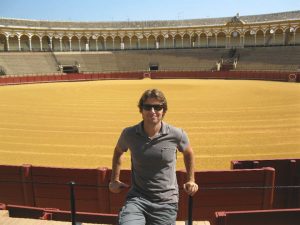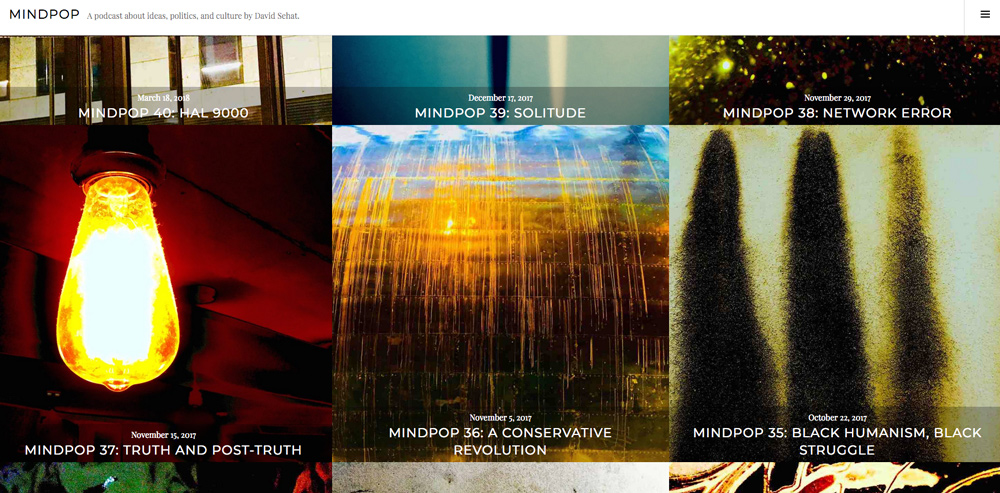 People I hadn’t seen since high school started texting me, saying ‘I just heard you on my favorite podcast!’” said Matt Andrews, teaching associate professor and undergraduate adviser for the History department, after his appearance on the top-rated podcast, 99% Invisible. Podcasts and other new media avenues like Twitter have created new ways for historians to engage wide audiences. But they present their own challenges, too.
People I hadn’t seen since high school started texting me, saying ‘I just heard you on my favorite podcast!’” said Matt Andrews, teaching associate professor and undergraduate adviser for the History department, after his appearance on the top-rated podcast, 99% Invisible. Podcasts and other new media avenues like Twitter have created new ways for historians to engage wide audiences. But they present their own challenges, too.
Many faculty and recent graduates are making use of these new tools. Andrews, who teaches sports and United States history, is collaborating with Jonathan Weiler, Director of Undergraduate Studies in the Global Studies Curriculum, to launch a podcast The Agony of Defeat. The podcast will discuss the intersection of sports and politics. Andrews sees it as an extension of his teaching, intended for people “who are interested in sport but don’t necessarily think about the links between sports and politics.” The University of North Carolina History alum, David Sehat (PhD, 2007) hosts a Mindpop—a podcast of sharp long-form interviews with scholars from a range of fields—now onto its fortieth episode.
A major part of the appeal of podcasting and Twitter is the power of these platforms to reach new audiences. “There’s a big push here at the university to reach the public beyond the walls of the academy,” Andrews said, “That’s one of the things that I’m most proud about what this could be: educating the larger public on the types of issues we talk about at the University.”
In 2015 Evan Faulkenbury helped start the Southern Oral History Program’s podcast, Press Record, while a graduate student in the history department. “Podcasts are a great way to get oral histories out of the archives and into people’s ears,” Faulkenbury said. The Southern Oral History Program designed the podcast with public accessibility in mind, sharing short clips and historical commentary.
Now an Assistant Professor at SUNY-Cortland, Faulkenbury does not think podcasts or social media platforms like Twitter can replace deeper scholarship, but they can present simplified historical analysis to wider audiences. “We can reach anyone worldwide,” he said. “From students to retirees, to History Channel addicts to someone needing a good podcast to listen to on the way to work.” He said that doing history for a wider audience in a different medium “makes us think about our scholarly work in a more beneficial-to-society way, gets the word out, and keeps historians relevant in our digital media age.”
There are benefits to using social media among historians as well. Faulkenbury said “Twitter is one of the best tools we can use.” The #Twitterstorian hashtag, which groups tweets by historians on Twitter, can be an excellent resource for ideas, advice, and moral support. Andrews added that Twitter has become a way for many historians to trade interesting articles. The Princeton historian Kevin Kruse (UNC History B.A., ’94) regularly tweets historical and political commentary to his eighty-nine thousand followers.
Within the department, staff have used Twitter, Facebook, and the photo-sharing site Instagram to showcase undergraduate students and participate in the online culture of the University.
Nevertheless, digital engagement presents some challenges.
The biggest obstacle, especially for podcasting, is time commitment. Even with the help of undergraduate staff, it’s “really hard to find time to sit down and do it,” Andrews said. Faulkenbury cautioned that podcasts “have to be done right, or they can be easily ignored. There’s so much content out there already, anything we produce can easily get lost in the internet void.” Unfortunately, he added, there is often little “return on the time investment” for tenure-track professors, since most universities’ tenure guidelines do not value social media work as much as old-fashioned academic publications.
The public nature of digital media also raises questions about liability for faculty. “When you’re on Twitter, are you a representative of the university or of yourself?” Andrews asked. He highlighted the case of George Ciccariello-Maher, who resigned from Drexel University in 2017 after conservative websites publicized some of his tweets. “Because I have my Twitter handle on my syllabus, I’m dedicated to only Tweeting things that have to do with sports or sports and politics.”
–Joshua Tait

